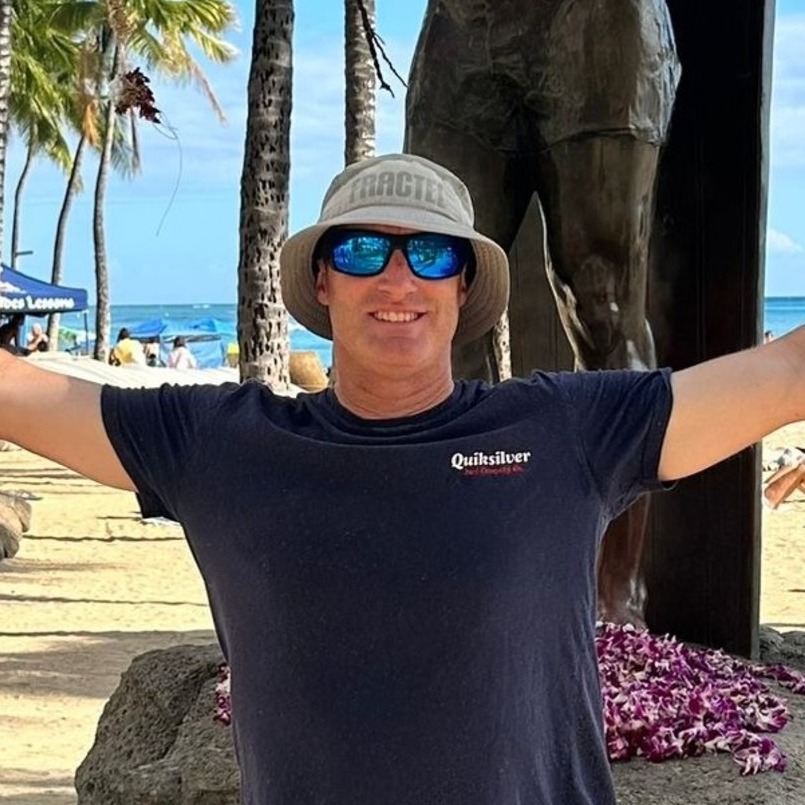
Andrew Byatt
ISA World Paddleboard Championship
Andrew's headline numbers
Andrew's strategy
Fueling
Carbohydrate is the main fuel you burn when racing. Failing to fuel properly is a leading cause of underperformance in longer races.
Being a much shorter event than the World Paddleboard Champs in Hawaii earlier this year, Andrew rightly put greater focus on his pre-race fueling at the ISA World Champs. In an attempt to maximise his glycogen stores ahead of the late afternoon race start, he ate plenty of simple carbohydrates throughout the morning. Simple carbohydrates, such as white bread, usually have a higher glycemic index compared with their more complex form (e.g. wholemeal bread) and are often lower in fibre and therefore easier to digest, making them more desirable prior to a race. In an event where the sport is dependent on his arms, Andrew relied entirely on fluids for his carb intake, using a bottle with a straw that sits in a mount built into the front of his board. This allowed him to meet the 30g of carb per hour scientific recommendations for an event lasting between 1-2 hours, whilst avoiding the faff of opening packets which would’ve otherwise slowed him down.
Hydration
Taking on board an appropriate amount of fluid and sodium is essential to maintaining blood volume and supporting the cardiovascular effort needed to perform on race day.
Whilst the absolute amount of sodium and fluid consumed per hour is important, it’s critical to consider these in relation to each other. This is known as 'relative sodium concentration' and it’s expressed in milligrams per litre (mg/L). How much sodium you’re taking in per litre of fluid is more important than the absolute amount taken in per hour.
Andrew made sure to start this Championship race well-hydrated, and with a fuel strategy reliant on fluid as the means of delivery, it ensured he was also able to stay on top of his sweat losses. He had finished his 500ml bottle 15 minutes before the line, taking on a relative sodium concentration of 1000mg/L using PF Carb & Electrolyte Drink Mix to replace his losses over the intense race, and helping to maintain his fluid balance.
Caffeine
Beyond the Three Levers of Performance (carb, sodium and fluid), caffeine is one of only a few substances that is proven to improve performance for most endurance athletes as it can help stave off mental and physical fatigue.
Andrew followed the scientific recommendations for the optimal caffeine dosage over a 0-3 hour race to a tee. Given caffeine’s ~4-5 hour half life, a pre-race caffeine dose would see him through until the finish line, as it would’ve remained in Andrew’s system over the course of the ~90 minute race. Knowing this, Andrew consumed three caffeine tablets to hit just over 3mg of caffeine per kilogram of his bodyweight 45 minutes before the race, and consequently ensured it peaked in his bloodstream right as he set off.
How Andrew hit his numbers
Here's everything that Andrew ate and drank on the day...
Andrew's weapons of choice
Final thoughts
Andrew's full stats
Data Confidence?
There is good confidence in the accuracy of the data reported. An athlete feels that the numbers closely reflect what they consumed despite a couple of estimations which may carry some degree of error. The majority of what was consumed is recorded to a high level of specificity (most volumes are known through the use of bottles brands quantities flavours). The numbers are very plausible and align with previous data recordings (if an athlete has collected data previously).